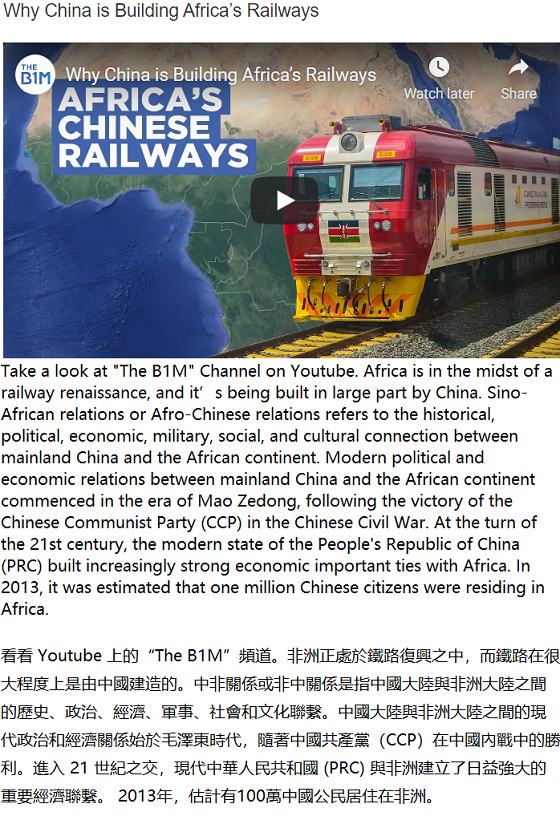Take a look at "The B1M" Channel on Youtube. Africa is in the midst of a railway renaissance, and it’s being built in large part by China.
Sino-African relations or Afro-Chinese relations refers to the historical, political, economic, military, social, and cultural connection between mainland China and the African continent.
Modern political and economic relations between mainland China and the African continent commenced in the era of Mao Zedong, following the victory of the Chinese Communist Party (CCP) in the Chinese Civil War. At the turn of the 21st century, the modern state of the People's Republic of China (PRC) built increasingly strong economic important ties with Africa. In 2013, it was estimated that one million Chinese citizens were residing in Africa.
Trade between China and Africa increased by 700% during the 1990s, and China is currently Africa's largest trading partner. The so-called Forum on China-Africa Cooperation (FOCAC) was established in October 2000, which designated itself to be an official forum to strengthen the relationship between both parties. There have been increasing international concerns over the significant political, economic, and military roles that the country of China is playing in the African continent.
China’s so-called "rail spending spree" in Africa seems to be over but it is still laying down the tracks. Chinese contractors have started work on a mega rail project in Tanzania, days after completing another in Nigeria.
However, it seems that loan restructurings and poor returns have made lenders more cautious, putting other projects on hold.
Just days after completing West Africa’s longest double-track standard railway in Nigeria, the China Civil Engineering Construction Corporation (CCECC) has started work on a US$1.3 billion railway on the other side of the continent, in Tanzania.
In the past decade, Beijing has strengthened its position as the largest contractor and financier of infrastructure in Africa, especially under the Belt and Road Initiative - President Xi Jinping’s trillion-dollar project that has seen the construction of railways, roads, ports and power plants.
看看 Youtube 上的“The B1M”頻道。非洲正處於鐵路復興之中,而鐵路在很大程度上是由中國建造的。
中非關係或非中關係是指中國大陸與非洲大陸之間的歷史、政治、經濟、軍事、社會和文化聯繫。
中國大陸與非洲大陸之間的現代政治和經濟關係始於毛澤東時代,隨著中國共產黨(CCP)在中國內戰中的勝利。進入 21 世紀之交,現代中華人民共和國 (PRC) 與非洲建立了日益強大的重要經濟聯繫。 2013年,估計有100萬中國公民居住在非洲。
1990年代中非貿易增長了700%,中國目前是非洲最大的貿易夥伴。所謂的中非合作論壇(FOCAC)成立於2000年10月,它被指定為加強雙方關係的官方論壇。國際社會越來越關注中國在非洲大陸所扮演的重要政治、經濟和軍事角色。
中國在非洲所謂的“鐵路支出狂潮”似乎已經結束,但仍在鋪設軌道。在尼日利亞完成另一個大型鐵路項目幾天后,中國承包商已開始在坦桑尼亞開展一個大型鐵路項目。
然而,貸款重組和糟糕的回報似乎讓貸方更加謹慎,擱置了其他項目。
在尼日利亞完成西非最長的雙軌標準鐵路幾天后,中國土木工程建設總公司(CCECC)已經開始在非洲大陸的另一邊的坦桑尼亞建設一條價值 13 億美元的鐵路。
在過去十年中,北京鞏固了其作為非洲最大的基礎設施承包商和融資方的地位,尤其是在“一帶一路”倡議下——習近平主席的萬億美元項目,見證了鐵路、公路、港口和發電廠的建設.


No comments:
Post a Comment